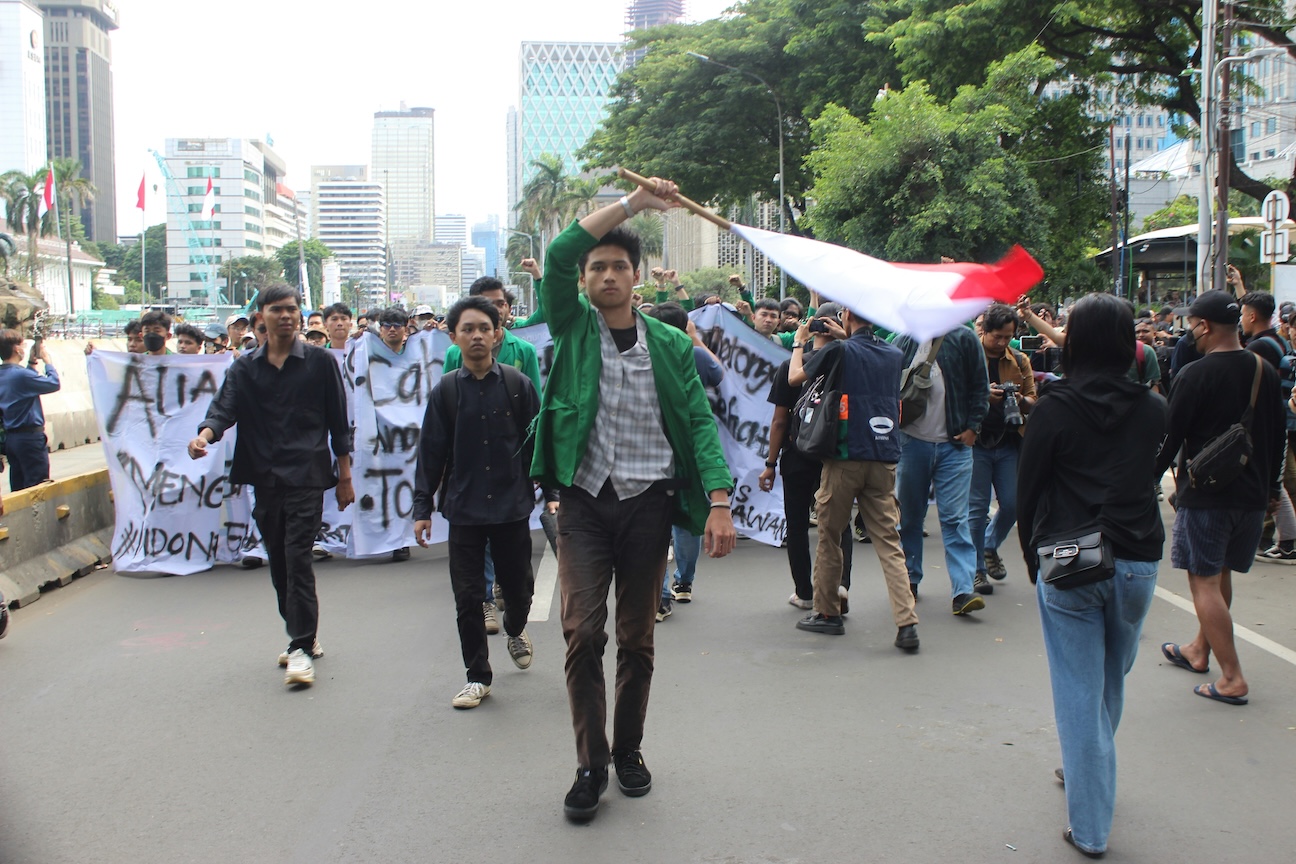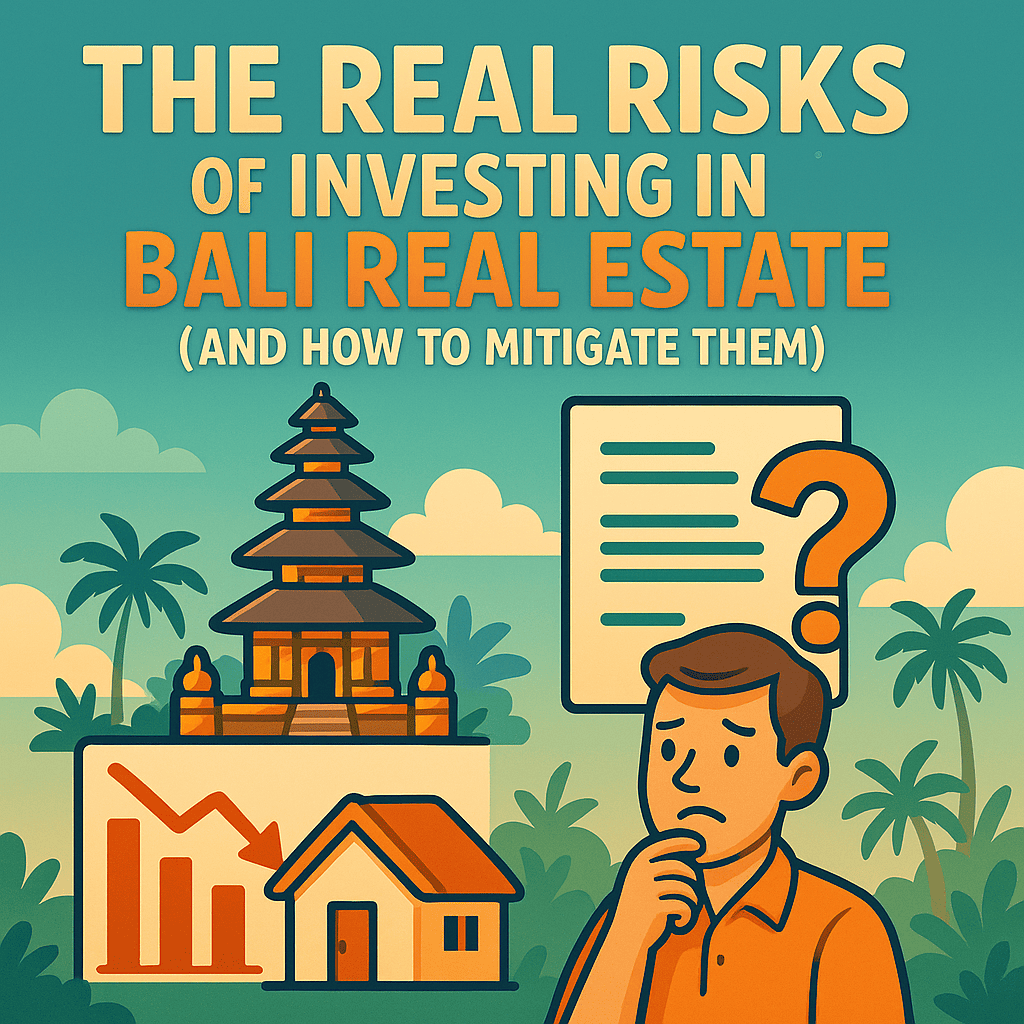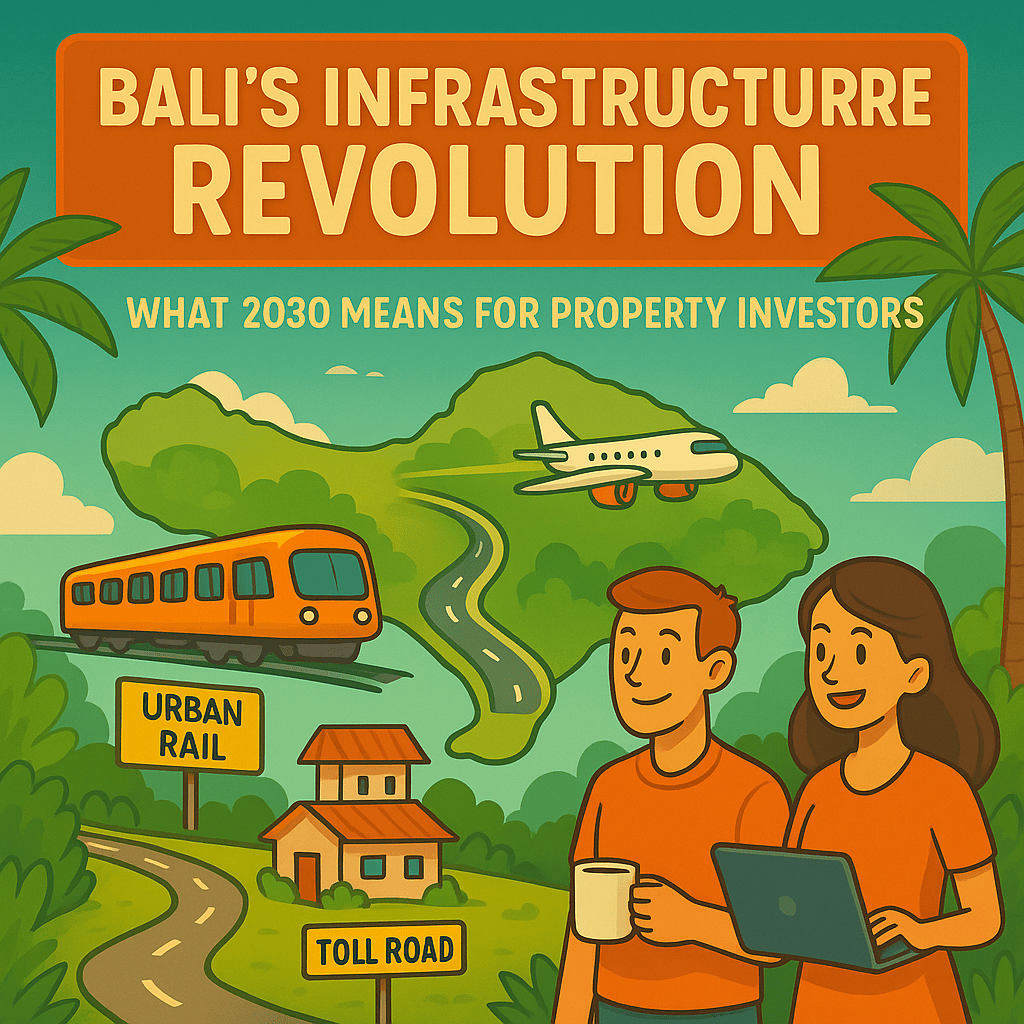When it comes to investing in Bali's booming property market, you'll find no shortage of articles highlighting the incredible opportunities—stunning returns on investment, a thriving tourism industry, and a lifestyle that's hard to beat. And yes, those advantages are real.
But at Tipi Estate, we believe in complete transparency. As serious real estate professionals, we have a responsibility to give you the full picture—not just the glossy highlights, but the genuine challenges you might face when investing in Bali property.
This isn't about discouraging you from investing in the Island of the Gods. Rather, it's about ensuring you make informed, strategic decisions that protect your investment and set you up for long-term success. Let's explore the seven key risks every foreign investor should understand before purchasing property in Bali.
1. Tourism Dependency and Market Volatility Risk

The Challenge
The vast majority of properties in Bali operate as short-term rentals, making them heavily dependent on tourism flow. When tourism slows—whether due to global events, pandemics, natural disasters, or economic downturns—booking rates can plummet significantly or even halt entirely, as we witnessed during the COVID-19 pandemic.
How to Mitigate This Risk
While you can't control global travel patterns, smart property selection can provide a safety net. Look for properties that offer flexibility in rental strategy:
- Dual-purpose properties: Choose villas that appeal to both tourists and long-term expat renters
- Location diversity: Properties in areas popular with Bali's growing expat community can pivot to long-term leases when short-term bookings decline
- Market research: Work with agents who understand which property types maintain occupancy across different market conditions
Risk Level: Low (with proper planning)
2. Leasehold Ownership and Regulatory Changes
The Challenge
Perhaps the most discussed concern among foreign investors is the leasehold system. The primary risk here is that your landowner may choose not to extend your lease when it expires. While Indonesia's leasehold framework is well-established and unlikely to undergo dramatic regulatory changes, maintaining positive relationships with landowners is essential.
How to Mitigate This Risk
Building and maintaining strong relationships with your landowner isn't just good practice—it's critical to your investment security:
- Cultural awareness: Simple gestures like acknowledging Balinese holidays (wishing someone a peaceful Nyepi, for example) demonstrate respect and build goodwill
- Regular communication: Stay in touch with your landowner throughout the lease period
- Lease length matters: Always ensure at least 20 years remain on the lease before purchasing
- Extension agreements: If the remaining lease is shorter, secure a written extension agreement as a condition of your purchase
- Professional guidance: Work with experienced agents who can facilitate proper lease negotiations
Risk Level: Rather Low (with relationship management)
3. Construction Quality and Structural Integrity Risk
The Challenge
This is an often-overlooked risk that can lead to expensive surprises down the line. Not all properties in Bali are built to the same standards, and issues like poor waterproofing, structural deficiencies, or substandard materials can result in costly repairs and maintenance challenges.
How to Mitigate This Risk
Due diligence on construction quality is non-negotiable:
- Professional inspections: Conduct thorough structural assessments before purchase
- Document review: Request complete construction drawings, including structural plans and MEP (Mechanical, Electrical, and Plumbing) specifications
- Leak detection: Check for any signs of water damage or leakage, particularly in Bali's humid climate
- Waterproofing verification: Ensure proper waterproofing has been applied, especially for pools and bathrooms
- Material quality: Ask about the materials used in construction and their expected lifespan
Don't be afraid to ask detailed questions—any reputable seller should be transparent about their property's construction.
Risk Level: Moderate (requires thorough inspection)
4. Developer and Contractor Reliability Risk

The Challenge
Unfortunately, Bali's real estate boom has attracted both reputable developers and less scrupulous operators. Stories of contractors disappearing mid-project with investor funds or developers selling properties that were never completed are real concerns in this market.
How to Mitigate This Risk
Protecting yourself from developer or contractor issues requires comprehensive research:
- Track record verification: Research the developer's history and completed projects
- Client testimonials: Ask for references from previous buyers and actually contact them
- Site visits: Visit both completed projects and ongoing construction sites to assess quality and progress
- Payment structure: Never pay the full amount upfront; use milestone-based payment schedules
- Legal protection: Ensure proper contracts are in place with penalty clauses for non-completion
- Escrow accounts: When possible, use third-party escrow services for construction payments
At Tipi Estate, we thoroughly vet all developers and contractors we work with to protect our clients from these risks.
Risk Level: Moderate (with proper due diligence)
5. Permits, Zoning, and Legal Compliance Risk
The Challenge
Not all properties in Bali have been built with the proper permits or on correctly zoned land. While this may have been overlooked in the past, the Indonesian government has recently intensified its enforcement efforts, conducting more thorough checks on properties across the island. Operating without proper documentation can result in fines, forced modifications, or even demolition orders.
How to Mitigate This Risk
Legal compliance should be at the top of your due diligence checklist:
- Permit verification: Ensure all construction permits are in place and legitimate. For older properties, this means IMB (Izin Mendirikan Bangunan). For newer properties, you'll need PBG (Persetujuan Bangunan Gedung) and SLF (Sertifikat Laik Fungsi)
- Zoning confirmation: Verify the land is properly zoned for your intended use (residential, commercial, hospitality)
- Pondok Wisata license: If you plan to operate the property as a short-term rental, ensure it has or can obtain a Pondok Wisata (homestay/guesthouse license)
- Professional review: Work with real estate agents who conduct comprehensive legal due diligence
This is a core service we provide at Tipi Estate—ensuring every property we represent meets all legal requirements.
Risk Level: Low to Moderate (with proper due diligence)
6. Market Liquidity and Resale Challenges
The Challenge
Bali's property market sees new listings almost daily, creating a competitive environment when you're ready to sell. Unlike more liquid markets, selling a villa in Bali can take considerable time, and you may need to hold the property longer than initially planned.
How to Mitigate This Risk
Strategic thinking at the purchase stage can significantly improve your exit options:
- Location, location, location: Prime areas with consistent demand (Seminyak, Canggu, Ubud, Uluwatu) typically sell faster
- Maximize ROI potential: Properties with strong rental income histories are more attractive to buyers
- Flexibility in use: Villas that can serve multiple purposes (vacation rental, long-term lease, personal use) appeal to a broader buyer pool
- Quality and maintenance: Well-maintained properties with updated amenities command premium prices and sell faster
- Realistic pricing: Work with experienced agents who understand current market values
Think long-term when purchasing—the best investments are those you'd be comfortable holding for 5-10 years.
Risk Level: Moderate (plan for longer holding periods)
7. Political and Economic Stability Risk

The Challenge
As with any international investment, political and economic conditions in the host country matter. While Indonesia's political landscape can experience periods of uncertainty, it's important to look at the broader picture.
The Reality
Indonesia is actually one of Southeast Asia's most stable democracies with a resilient economy. In fact, economic forecasts predict Indonesia will become the world's 5th largest economy by 2075 or earlier, driven by its young population, growing middle class, and strategic location.
How to Mitigate This Risk
Honestly, there's limited direct action you can take regarding macroeconomic factors, but you can:
- Diversify: Don't put all your investment capital in a single market
- Stay informed: Monitor economic indicators and political developments
- Long-term perspective: Real estate is typically a long-term investment that weathers short-term political fluctuations
- Currency considerations: Understand how exchange rate movements might affect your investment returns
Risk Level: Low (Indonesia's economic outlook is positive)
Making Informed Investment Decisions in Bali
Understanding these risks doesn't mean you should avoid investing in Bali—quite the opposite. The Island of the Gods continues to offer exceptional opportunities for property investors, with strong rental yields, growing tourism numbers, and increasing demand from expats choosing to make Bali their home.
What separates successful investors from those who struggle is simple: knowledge and professional guidance.
By acknowledging these challenges upfront and implementing proper mitigation strategies, you can protect your investment while enjoying the significant rewards Bali's real estate market has to offer.
Your Investment Checklist
Before purchasing property in Bali, ensure you've addressed:
- ✓ Lease length and landowner relationship strategy
- ✓ Comprehensive property inspection and construction quality assessment
- ✓ Developer and contractor background verification
- ✓ Complete legal due diligence on permits and zoning
- ✓ Strategic location selection for long-term value
- ✓ Flexibility in property use and rental strategy
- ✓ Realistic expectations on holding period and liquidity
Work with Professionals Who Tell You the Truth
At Tipi Estate, we believe transparency builds trust. We're not here to paint an unrealistically rosy picture or minimize genuine concerns. Instead, we're committed to providing you with honest, expert guidance that helps you navigate Bali's real estate market with confidence.
Our comprehensive due diligence process addresses every risk outlined in this article. From verifying permits and lease agreements to assessing construction quality and vetting developers, we handle the complex details so you can focus on finding the perfect property for your investment goals.
Whether you're interested in purchasing a luxury villa, investing in Bali's rental market, or securing your retirement dream home, our team offers the local expertise and personalized service you need to make smart, protected investment decisions.












